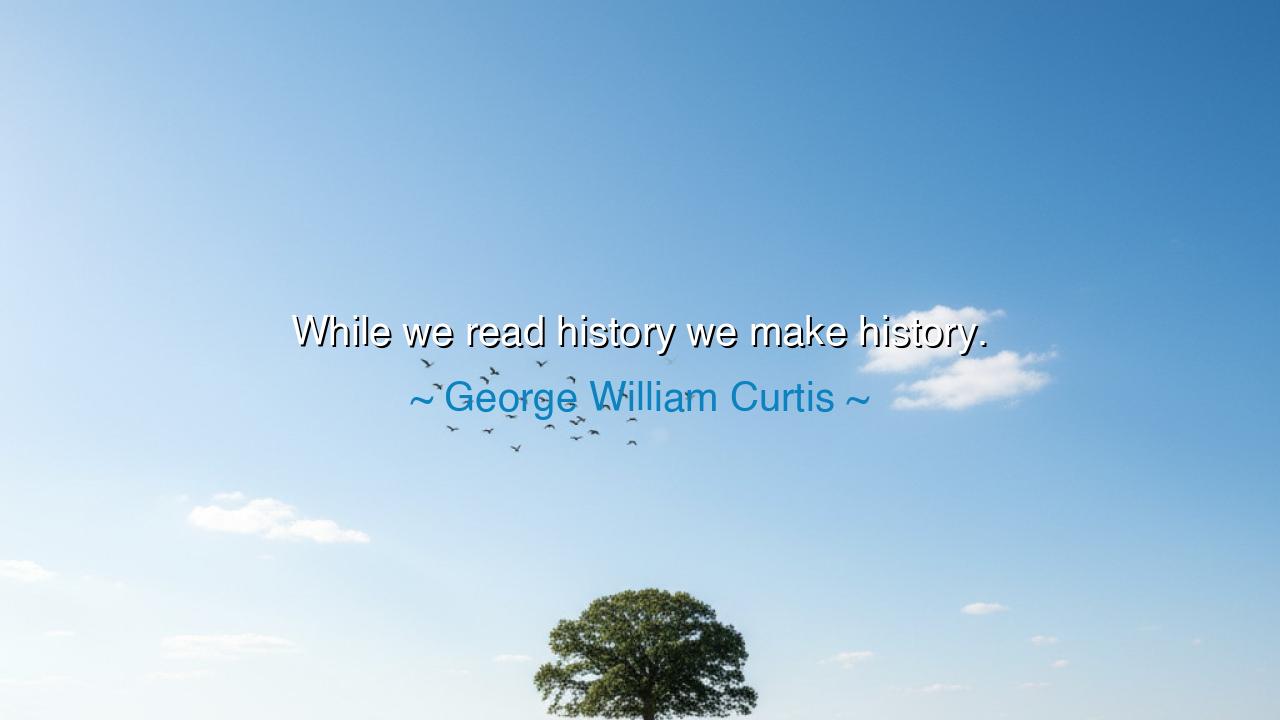
While we read history we make history.






“While we read history we make history.” – George William Curtis
In these few words lies a truth older than empires and as alive as the beating of the human heart. To read history is not merely to gaze upon the relics of the past; it is to enter into communion with the spirits of those who have walked before us. Each page we turn is a torch passed from the dead to the living, its flame demanding not worship, but continuation. Curtis reminds us that even as we study the chronicles of kings and revolutionaries, we ourselves are shaping the next chapter, unseen yet inevitable.
When we read of the triumphs and follies of our ancestors, we do not stand apart as idle spectators. We awaken the echoes of their deeds within our own souls. Every act of understanding stirs the world anew, for knowledge kindles action, and reflection births resolve. The reader who contemplates the rise of Rome or the fall of empires is not separate from them; they are both witness and heir, burdened with the solemn duty to carry forward the story with honor and wisdom. Thus, to read history is to participate in its unfolding—to become, by choice or by neglect, a maker of destiny.
Consider the tale of Mahatma Gandhi, who once read of Christ’s Sermon on the Mount and the teachings of Tolstoy. These words, ancient and quiet, lit within him a fire that would shake the British Empire. From the written thoughts of distant men, Gandhi drew the courage to forge a path of nonviolent resistance, changing the course of nations. In his reading, history spoke; in his living, history was made. The ink of the past became the blood of transformation. So it is with all who listen deeply to the lessons of time — they do not leave the book unchanged, nor do they leave the world untouched.
Yet, many read as one might wander through ruins — with awe, but without understanding. They forget that history is not a monument of stone, but a mirror of the soul. To read it rightly is to look into that mirror and ask, “What shall I add to the reflection?” Each generation inherits both the wisdom and the wounds of those before it. The wars they fought, the ideals they pursued, the injustices they endured — these are not relics, but roots. From them, we grow. Every citizen, every artist, every worker of honest hands continues the sacred labor of shaping tomorrow’s record.
Curtis’s words are not a gentle musing, but a call to awakening. They remind us that we cannot excuse our inaction by pointing to the pages of the past. The heroes we read of were not born of different clay; they were men and women who chose to act when others hesitated. The same courage that built civilizations and overthrew tyrannies sleeps within us still. To read of their deeds is to inherit their unfinished work. History’s scroll is not sealed; it waits for our signatures, written in deeds, in sacrifice, in vision.
Let us therefore read with purpose, not for pride or curiosity, but for transformation. Let us ask not only, “What happened?” but “What now shall I do?” When we study the rise of justice, let us practice it; when we witness the decay of virtue, let us guard against it in our own time. To read passively is to let the past turn to dust; to read actively is to let it breathe again through our words, our hands, our lives.
And so, dear seeker of wisdom, remember: every moment you live with awareness, you make history anew. Whether you build a bridge, mend a wound, or speak truth when silence tempts you, you become the living page of the human chronicle. The lesson, then, is simple yet profound — read deeply, act bravely, and live consciously. For in doing so, you fulfill Curtis’s eternal vision: that while the eyes rest upon the past, the heart and hands must labor for the future.
Thus, let the final word be this — history is not behind us; it walks beside us, waiting for the bold to write.






AAdministratorAdministrator
Welcome, honored guests. Please leave a comment, we will respond soon